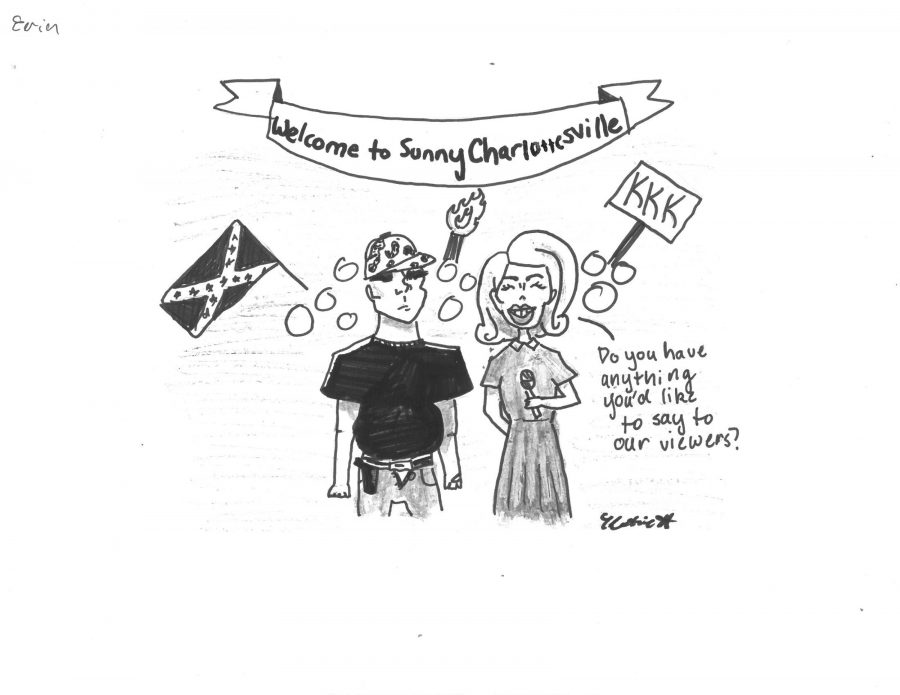By Erin Schultz, associate editor-in-chief
From every middle school newspaper club to every Journalism 501 class, the first rule any student learns is that journalists must be Switzerland. Bias, though human nature, is frowned upon, and if detected, will make you less of a journalist.
But oftentimes what is left out in journalists’ education is a reminder that they are still human beings. It’s so easy to adhere to the rules of journalism that, especially in the past few years, journalists have given a podium to people who don’t deserve one.
Biased journalism is not the only way to give someone a podium, however. By allowing an organization to defend themselves — which is seen as a journalistic must — you are taking an editorial stance. Let me be clear; this does not apply to every situation. If you’re writing about a complicated, nuanced subject such as healthcare, all sides need to be addressed. But there are some situations that are clearly one-sided, such as neo-Nazism and its rise in the United States.
A recent instance of this was in August; the alt-right riot in Charlottesville, Virginia — formally named “Unite the Right” — made headlines for weeks after the event. Vice aired a 22-minute-long documentary on HBO in which they interviewed participants in the riot. Even though Vice’s intent was likely not to defend neo-Nazisim, that’s the impression the documentary gave off. By allowing Nazis to explain why they’re protesting and chanting, “Jews will not replace us” and “Blood and soil,” Vice was giving Nazism a face and a name: Jason Kessler, specifically.
Kessler organized the riot and in turn, received extensive coverage. Publications from The Washington Post to Slate quoted him in stories, giving him a national voice.
In fact, according to The Daily Progress, Kessler will be moving to Ohio and living with someone he knew through his participation in white nationalist rallies, but whom he had not met. The press accidentally turned Kessler into a household name among white nationalists which only helped him, not hurt him.
The cliché “all press is good press” actually does apply here; even though news outlets aren’t trying to portray Kessler as a protagonist, that’s the impression a select few people get from their coverage.
And by giving these people a face, name and personality, journalists are humanizing them. It is easier to empathize with them because they’re not a group; they’re a single person, just like you.
This problem leaves journalists with two options: adhering to the rules their professors taught them or covering just one side of issues like Nazism and terrorism and being overtly biased in order to contribute to a greater good.
This may sound extreme, but the latter would make the United States a much less divisive place. Not giving Nazis, terrorists and bigots representation in the media would delegitimize their role as Nazis, terrorists and bigots. If a stand-up comedian tells a joke and the audience doesn’t laugh, they likely won’t tell that joke again. If a Nazi organizes a riot and no one covers it via a news outlet, social media or through word of mouth, they probably won’t do it again.
The media determines what we as a society value, so if they continue to give Nazis press coverage, the public will continue to pay attention. And there will always be sympathizers if the press tells Nazis’ stories.
The media missed important coverage of events such as the hurricane in Puerto Rico and continues to give President Donald J. Trump’s tweets headlines. Giving a spotlight to voices that do not contribute to the public encourages them to keep marching and keep fighting. We all know how frustrating it is for our hard work not to be acknowledged, and often we give up. If we want Nazis to give up, we need to stop humanizing them and start ignoring them. The press needs to take a stance. Like President John F. Kennedy said when quoting Dante, “The hottest places in hell are reserved for those who, in times of great moral crisis, maintain their neutrality.”
Categories:
What journalists get wrong about journalism
November 7, 2017
0
Donate to ProspectorNow
This coming fall, we plan on traveling to the 2025 National High School Journalism Convention in Nashville, Tennessee, where we'll learn from professionals and get better at what we do: making the best multimedia student journalism in the state. If you've ever found anything of worth on this website, please consider donating to offset the cost.




































































